
This is a crosspost from the original on Lemmygrad here.
On the road to high-income
This is the 1st part of a 2-part series that aims to elucidate postcolonial Malaysian history. The 2nd part will focus on Malaysian-Chinese relations as an elaboration of the history and contradictions discussed here.
Each country in the region possesses its own unique and identifiable characteristic; Singapore is a hyper-capitalist dystopia, perhaps the only one in the region that could claim first-world status; Vietnam is a market socialist republic, ironically not unlike its bitter rival, China; Thailand is perhaps globally unique in its mix of royal and military authoritarianism; Brunei is akin to a Gulf State, with its oil wealth and Islamic absolute monarchy whereas the Philippines is more akin to a Latin American nation-state with its strongmen figures, cartel problems and US imperial interference.
Malaysia on the other hand can be identified by one particular characteristic: its profound mediocrity. It is rich, but not as rich as Singapore. It is authoritarian and corrupt, but never to the extent that can be found in its neighbours such as Indonesia, Thailand and the Philippines. Leaders incompetent as such that they cannot be counted on to save their ass, and reformers so dull it cannot be counted on to pursue. On the whole, Malaysia is always reliably second place to something, in all things good or bad it always falls short of excellence. A jack of all trades, master of none. If Malaysia had another name, one could surmise it to be “Asal Boleh”.[^1]
the rest of the essay
Malaysia gained independence in 1957 with over 50% of the population living in poverty. The ruling classes, who collaborated with the colonizers in persecuting communists and left forces, were forced to embark on a series of developmentalist policies to negate rising class consciousness among the populace.
Ghana and Malaysia were once taught of as twin brothers, having gained independence in the same year with an economy of a similar size and structure. Now, after more than 65 years have passed, the story could be anything but different. Malaysia’s GDP per capita is now 5 times larger, life expectancy 11 years longer and manufactured goods account for more than 80% of exports. In stark contrast to Ghana, which still is stuck in raw commodity exports, priamrily gold.
Over the course of the 70s, 80s and 90s, a push for industrialisation saw the creation of a national car company, the establishment of semiconductor manufacturing in the northern state of Penang and the mechanisation of Palm Oil production, making Malaysia the world’s largest producer until 2006, when much more populous Indonesia finally overtook the country. Crucially, Malaysia also retained state control of its oil sector under the national banner of Petronas which continues to be a major source of foreign exchange and income.
The aftermath of the 1997-98 Asian financial crisis prematurely ended this era of industrialisation. However unlike Malaysia’s neighbouring states, the nation’s state finances were largely positive and could afford to refuse the diktats of the IMF and World Bank that called for much more vast and expansive neoliberal structural adjustments. Additional competition from Chinese manufacturing meant Malaysia’s manufacturing sector was on the downturn during the 2000s and remained stagnant for much of the 2010s.
As the government steps into its 12th 5-year plan in 2020, an emphasis on (re-)industrialisation has now begun. Coupled with its New Industrial Master Plan 2030, the government now seeks to transform the economy to finally graduate from its upper-middle income status by 2030.
This would mark a first for a postcolonial country of a modest size and ethnic diversity to graduate to high-income. It would ultimately also be a first because it is a country that stood more in defiance than support of the West for much of its history.
The “New” Political Economy
However, this defiance in practice is quite restrained, as the country’s open economy means it is unable to antagonise any major economies, which includes the USA. This is reflected in the establishment’s reluctance in leaving the Five Powers Defence Arrangement (FDPA), a remnant of the country’s colonial history that stipulates military co-operation with it’s former colonial masters, the United Kingdom, and her other colonies, namely, Singapore, Australia and New Zealand.
Furthermore, there are still structural blocks that are withholding the nation’s ability to bring general prosperity to all. The racialized economic base remains largely unchanged since the colonial era, with one major exception, which is the establishment of an indigenous Malay-Muslim bourgeosie that benefits heavily from the inflated government bureaucracy and extensive network of government-owned and government-linked companies. Outside the public sector, which remains Malay-Muslim dominated, the private sector is still dominated by local Chinese and Indian haute-bourgeoisie that benefit from this racial stratification of the economy.
In the past, the British brought waves of Chinese, Indian and Javanese migrants to Malaya to work in the plantations and mines. Now, this pattern continues with Malaysia’s over-reliance and super-exploitation of foreign South Asian labour that depresses wages locally. Roughly 10% of Malaysia’s population are immigrants, amounting to 3 million, with an additional 2-3 million undocumented. Hosting the largest Bangladeshi population outside of Bangladesh itself.
The successful urbanisation and proletarianisation of a large vast of the Malaysian population, lead to the rise of a modern political Islam that, similar to Mao’s famous saying, is “surrounding the cities from the countryside”. In contrast to this radical political Islam is the rise of an affluent urban middle class, whose ideological pretensions vacillate between comprador anglophilia to “secular” cultural nationalism. This is reflected in the numerous political parties that dot the landscape of Malaysian politics, all with it's own class and ideological affiliations.
Malaysia is now at the crossroads of old and new. Questions of Marxism and Communism, which continue to be slandered in the political mainstream for being extremist, anti-thiest, and antithetical to “Asian culture”, is being countered at an astonishing rate for many who are tired of the old Cold War rhetorics. Figures that were sidelined and entire political histories ignored after the defeat of the left forces, are being rediscovered as many are fed up with the promises of development seemingly only benefiting those at the top.
Malaysia is not exempt from the transformations taking place in the larger world economy. In fact, Malaysian history is defined by its location between trading destinations which caused it to be colonized in the first place. For better or for worse, this central location allowed Malaysia to have an open (political) economy of remarkable fluidity and diversity. Internationalism is never too far from home.
[^1]:Sourced from an online essay titled "The New Cannot Be Born: Reflections on Politics in the Land of Mediocrities" by Anas Nor’Azim. Link.
This is the 1st part of a 2-part series that aims to elucidate postcolonial Malaysian history. The 2nd part will focus on Malaysian-Chinese relations as an elaboration of the history and contradictions discussed here.
> Each country in the region possesses its own unique and identifiable characteristic; Singapore is a hyper-capitalist dystopia, perhaps the only one in the region that could claim first-world status; Vietnam is a market socialist republic, ironically not unlike its bitter rival, China; Thailand is perhaps globally unique in its mix of royal and military authoritarianism; Brunei is akin to a Gulf State, with its oil wealth and Islamic absolute monarchy whereas the Philippines is more akin to a Latin American nation-state with its strongmen figures, cartel problems and US imperial interference.
> Malaysia on the other hand can be identified by one particular characteristic: its profound mediocrity. It is rich, but not as rich as Singapore. It is authoritarian and corrupt, but never to the extent that can be found in its neighbours such as Indonesia, Thailand and the Philippines. Leaders incompetent as such that they cannot be counted on to save their ass, and reformers so dull it cannot be counted on to pursue. On the whole, Malaysia is always reliably second place to something, in all things good or bad it always falls short of excellence. A jack of all trades, master of none. If Malaysia had another name, one could surmise it to be “Asal Boleh”.[^1]
Malaysia gained independence in 1957 with over 50% of the population living in poverty. The ruling classes, who collaborated with the colonizers in persecuting communists and left forces, were forced to embark on a series of developmentalist policies to negate rising class consciousness among the populace.
Ghana and Malaysia were once taught of as twin brothers, having gained independence in the same year with an economy of a similar size and structure. Now, after more than 65 years have passed, the story could be anything but different. Malaysia’s GDP per capita is now 5 times larger, life expectancy 11 years longer and manufactured goods account for more than 80% of exports. In stark contrast to Ghana, which still is stuck in raw commodity exports, priamrily gold.
Over the course of the 70s, 80s and 90s, a push for industrialisation saw the creation of a national car company, the establishment of semiconductor manufacturing in the northern state of Penang and the mechanisation of Palm Oil production, making Malaysia the world’s largest producer until 2006, when much more populous Indonesia finally overtook the country. Crucially, Malaysia also retained state control of its oil sector under the national banner of Petronas which continues to be a major source of foreign exchange and income.
The aftermath of the 1997-98 Asian financial crisis prematurely ended this era of industrialisation. However unlike Malaysia’s neighbouring states, the nation’s state finances were largely positive and could afford to refuse the diktats of the IMF and World Bank that called for much more vast and expansive neoliberal structural adjustments. Additional competition from Chinese manufacturing meant Malaysia’s manufacturing sector was on the downturn during the 2000s and remained stagnant for much of the 2010s.
As the government steps into its 12th 5-year plan in 2020, an emphasis on (re-)industrialisation has now begun. Coupled with its New Industrial Master Plan 2030, the government now seeks to transform the economy to finally graduate from its upper-middle income status by 2030.
This would mark a first for a postcolonial country of a modest size and ethnic diversity to graduate to high-income. It would ultimately also be a first because it is a country that stood more in defiance than support of the West for much of its history.
The “New” Political Economy
However, this defiance in practice is quite restrained, as the country’s open economy means it is unable to antagonise any major economies, which includes the USA. This is reflected in the establishment’s reluctance in leaving the Five Powers Defence Arrangement (FDPA), a remnant of the country’s colonial history that stipulates military co-operation with it’s former colonial masters, the United Kingdom, and her other colonies, namely, Singapore, Australia and New Zealand.
Furthermore, there are still structural blocks that are withholding the nation’s ability to bring general prosperity to all. The racialized economic base remains largely unchanged since the colonial era, with one major exception, which is the establishment of an indigenous Malay-Muslim bourgeosie that benefits heavily from the inflated government bureaucracy and extensive network of government-owned and government-linked companies. Outside the public sector, which remains Malay-Muslim dominated, the private sector is still dominated by local Chinese and Indian haute-bourgeoisie that benefit from this racial stratification of the economy.
In the past, the British brought waves of Chinese, Indian and Javanese migrants to Malaya to work in the plantations and mines. Now, this pattern continues with Malaysia’s over-reliance and super-exploitation of foreign South Asian labour that depresses wages locally. Roughly 10% of Malaysia’s population are immigrants, amounting to 3 million, with an additional 2-3 million undocumented. Hosting the largest Bangladeshi population outside of Bangladesh itself.
The successful urbanisation and proletarianisation of a large vast of the Malaysian population, lead to the rise of a modern political Islam that, similar to Mao’s famous saying, is “surrounding the cities from the countryside”. In contrast to this radical political Islam is the rise of an affluent urban middle class, whose ideological pretensions vacillate between comprador anglophilia to “secular” cultural nationalism. This is reflected in the numerous political parties that dot the landscape of Malaysian politics, all with it's own class and ideological affiliations.
Malaysia is now at the crossroads of old and new. Questions of Marxism and Communism, which continue to be slandered in the political mainstream for being extremist, anti-thiest, and antithetical to “Asian culture”, is being countered at an astonishing rate for many who are tired of the old Cold War rhetorics. Figures that were sidelined and entire political histories ignored after the defeat of the left forces, are being rediscovered as many are fed up with the promises of development seemingly only benefiting those at the top.
Malaysia is not exempt from the transformations taking place in the larger world economy. In fact, Malaysian history is defined by its location between trading destinations which caused it to be colonized in the first place. For better or for worse, this central location allowed Malaysia to have an open (political) economy of remarkable fluidity and diversity. Internationalism is never too far from home.
[^1]:Sourced from an online essay titled "The New Cannot Be Born: Reflections on Politics in the Land of Mediocrities" by Anas Nor’Azim. Link.
Late response but surau is only used in Southeast Asia.
The surau (a small prayer house) is the cornerstone of every village community here. Education, communal meetings and gatherings, and spirituality is found there.
In every surau, in every prayer - 5 times a day, in every khutbah, in every doaa, Palestine and Gaza is mentioned.
The same can’t be said about Saudi Arabia.
I can’t recall the number of Palestinian flags I have came across throughout the countryside and urban areas. That’s the reality of the mass support of Palestine.
May Allah grant victory to those that have been wronged. Amin.
Death to Capitalism and Imperialism.
Death to the Persian Gulf monarchies and Israel.
Death to Amerika.
This has been the second time that I know of where there was news of an alleged Israeli normalization wrt to Indonesia.
Both are false from what I know and as you point out. It is overwhelmingly unpopular to normalize, historically, currently, and for the foreseeable future.
Normalization would anger both major factions of Indonesian Islam, Muhammadiyah and Nahdlatul Ulama. It is politically unfeasible.
I can only suspect the cause for such fake news to spread, probably as means of hybrid warfare of course, but the specific aims remains to be seen.
Free Malaysia Today despite the cringe name is okay in terms of news. I say it represents a neutral (Malaysian wise, so much much better) if slightly left-leaning on marginal local issues.
As for the the upgrading of military ties, yes that is true, and Western news source often amplify this fact when talking about Indonesian relations. However in reality, economically, Indonesia has always benefitted more from Chinese trade than the USA, unlike what can be said about Viet Nam, so I would still class it as par for the course for Indonesian foreign policy.
Unfortunately the aid dropping thing is common parlance for those supporting Palestine in Southeast Asia. The Jakarta Post is known to be a propaganda outlet for the ruling Indonesian establishment though. I suspect this “announcement” was made just for cheap political points locally.
Nothing fundamentally changes as of now.
It is unwise to portray all compradors and national bourgeoisie as having the same interests as each other. There are differences that can and should be exploited by left forces.
On Friday, Bolivia's foreign ministry issued a statement, saying the country "expresses its solidarity with the sister People's Republic of China, in the face of the loss of life and severe material damage caused by a large earthquake that occurred in recent hours off the coast of Taiwan".
Lol
Taiwan slams Bolivia for quake solidarity with China - CNA
DPP authorities' politicization of earthquake a 'secondary disaster' to Taiwan residents - Global Times
I couldn’t find the actual statement on their website.
I am not one to usually post deeply cynical stuff, but was going through Andre Vltchek’s works and this section especially relevant.
“It is a brutal horror show, the never-ending awfulness of Western neo-colonialism, as well as the sleazy servility of local rulers. The results are omnipresent: the beaches of entire countries are devastated and privatized. Whole enormous islands like Borneo, Papua and Sumatra are finished, scarred and poisoned by local and multi-national corporations. It is smoke and filth, clogged rivers, collapsed cultures. Entire ancient civilizations are wiped-out, converted to 4th rate replicas of Disneyland. No mercy, no compassion, no future.
But it is all hushed up. Crimes are denied. Outraged, confused nations are called ‘lands of smiles’, or ‘’friendly and tolerant archipelagos’.
It is insane, but tens of millions of foreign tourists descend on this ruined part of the world, annually. They see nothing. Some like it. They only nurture their complexes of superiority here. They do not want to understand anything. They choose to be blind. Cheap sex, shitty alcohol and beach food, as well as monumental sunburns. They continue the demolition work which has been triggered by their governments and corporations.”
Thailand’s economy stumbles as Philippines, Vietnam, Indonesia race ahead
Thai economy is falling far behind its Southeast Asian peers amid growing middle-income trap fears.
Growing fears? Thailand has been in the trap since the 1997-98 financial crisis that the imperialists subjected the country to. Surprising that when foreigners run a speculative roulette in your economy, it collapses! GDP growth has never been the same afterwards.
Now, under an 200 years-outdated Royal-Military superstructure I don’t see how things will improve. Suffering with a fertility rate of 1.3 without the economic development of South Korea, Japan or Singapore.
China’s BRI will help with badly needed infrastructure but the rot goes deeper. It is projected that Viet Nam will reach parity with Thailand’s economy by 2030, and soon overtake it after that. Long gone are the days of import-substitution industrialization.
Thailand may have escaped the tumultuous period of European colonization from the 1500s-1800s but is now suffering under the imperialism and “neo-imperialism” of the 1900s and 2000s.
No wonder Thailand ruling class has shifted it’s alliances towards China, as shown by the recent ISEAS poll. However, NGOs and “activists” have now been mobilised in this moribund economy to maintain US hegemony.
Betrayed and continuing to be betrayed by the West for 100 years. Sometimes we learn the lesson the hard way.
It may be dangerous to be America's enemy, but to be America's friend is fatal.
Ironic isn’t it?
The countries that were most influenced by Chinese culture are often the most anti-Chinese.
South Korea, Japan and Vietnam.
Singapore still has the next largest proportion of muslims in Southeast Asia, 15%.
And as much as they act otherwise, Singapore is still within the cultural realm of Malaysia, Indonesia and Brunei. They inevitably will be influenced by the trends seen in their neighbouring countries.
From that ISEAS survey that was linked before:
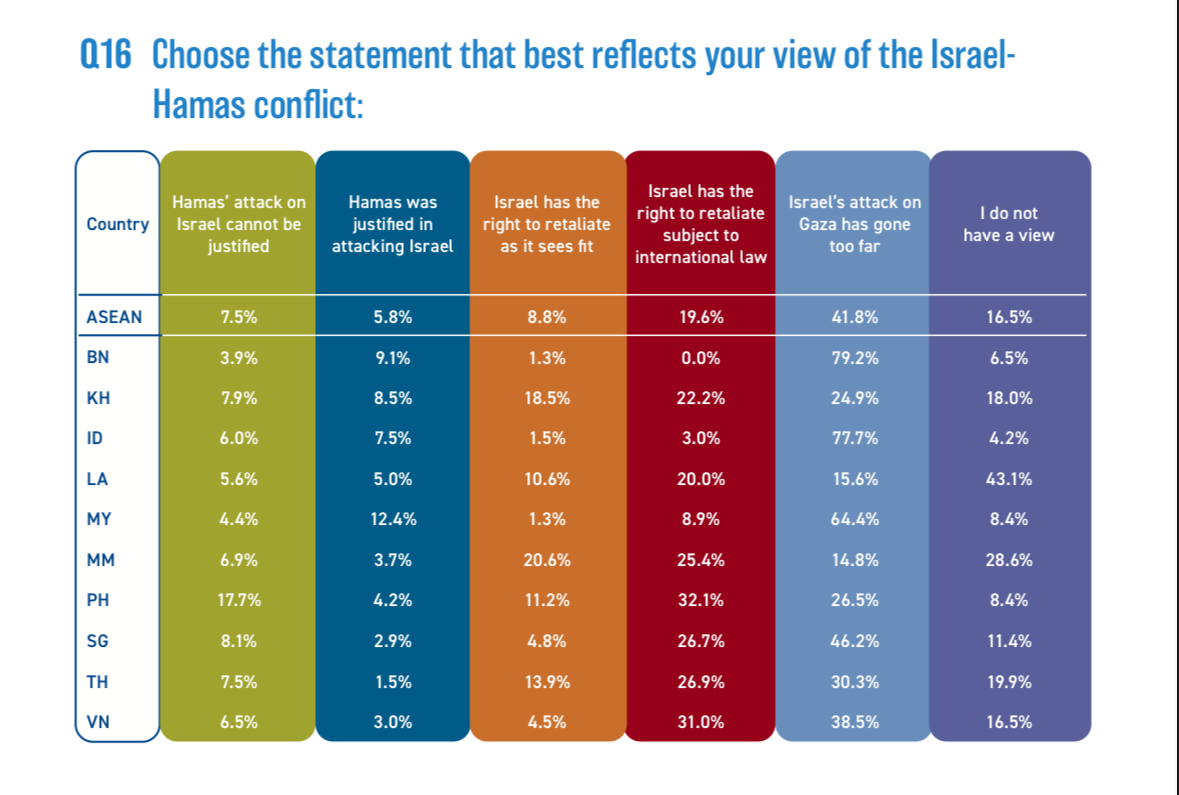
12.4% in Malaysia says Hamas was justified in attacking Israel
I serve the red, white and blue 🇲🇾🇲🇾

Although that plays a large part, Muslim Southeast Asia has always been more China friendly than the rest. Even after Western propaganda regarding the Uyghurs.
In the survey itself, I think the more interesting shift is Thailand, Cambodia and Myanmar edging closer or slightly surpassing the 50% mark.
It depends on the country I feel. I think Singapore/Indonesia is more China friendly on the ground than is reflected in the polls. Philipines is much more neutral.
Myanmar - I am unsure which specific people and group they polled but I think certain ethnic enclaves are much more China friendly than it implies, especially along the border with China.
Important to note that the ISEAS-Yusof Survey has always measured the opinions of the elites and the professional middle classes moreso than the average person.
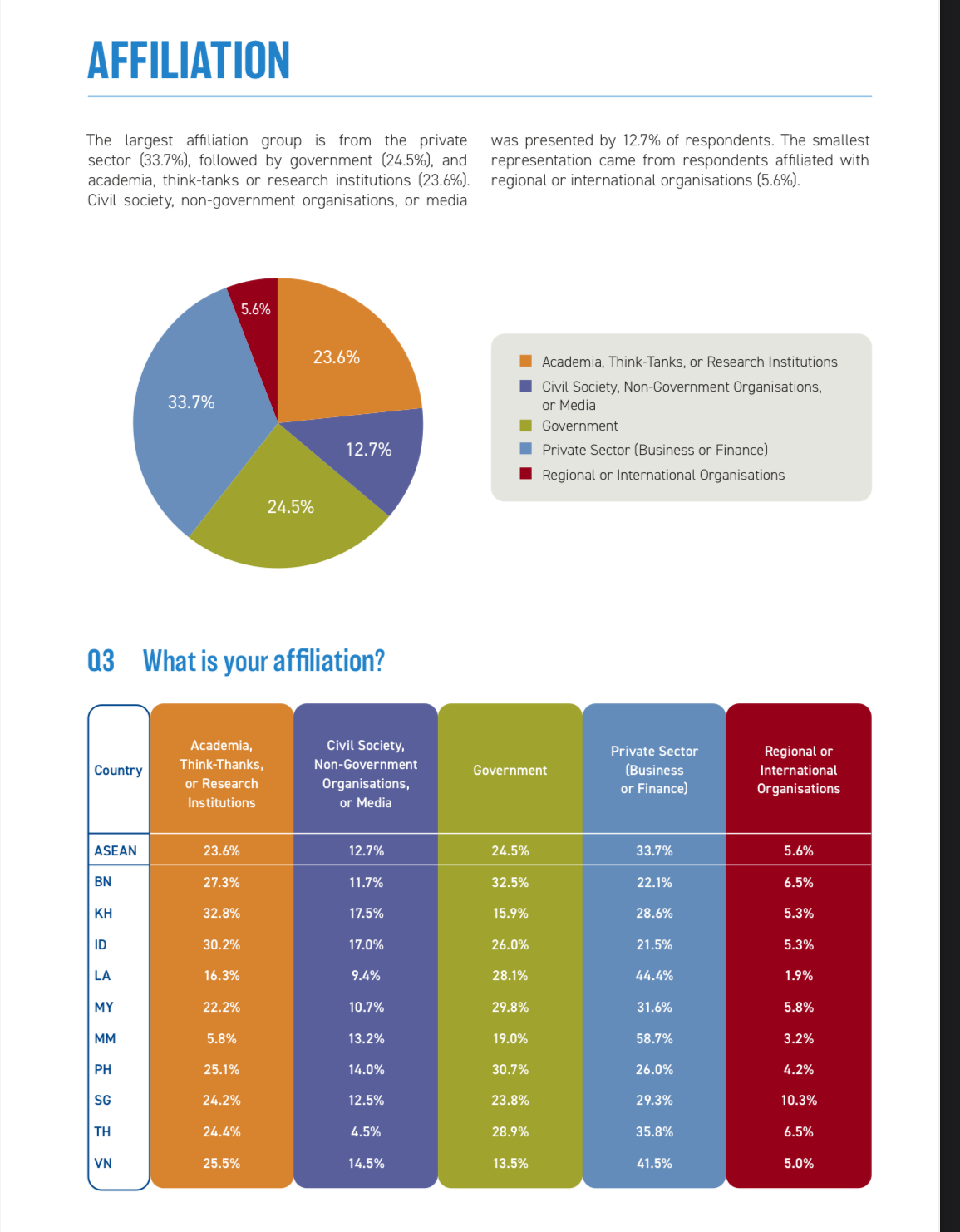
Pan-Africanism as a political ideology isn’t some kind of Russian influence operation; it actually predates even the Russian Revolution
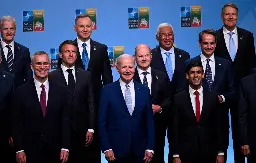
I definitely agree.
This article “Why ‘non-alignment’ is obsolete, costly optical illusion” does go over some issues regarding the toothless Non-aligned Movement if they do not fully commit to truly being independent like Iran or Belarus. I don’t really have any good arguments against what the author is saying, even if it’s mainly referring to an African context.
I assume you mean DPRK’s relation with Indonesia/Malaysia?
From what I know there is some trade that goes on between both countries and North Korea but it is quite minuscule.
Right now North Korea still struggles with agricultural production and requires imports but both Malaysia/Indonesia, suffering from Imperialism, means that they are unable to provide what North Korea wants. Both Indonesia and Malaysia are net food importers. Indonesia especially is neo-colonized and de-industrialized.
Although Malaysia is able to provide industrial electronic goods, North Korea is able to source them directly from China which I assume is much easier and cheaper. Military equipment wise both Indonesia/Malaysia defence industries are undeveloped and so that also hampers any potential for trade with North Korea.
The relations between North Korea and Malaysia/Indonesia has and will probably continue to be mostly symbolic but I think the future does look brighter. Inshallah.
Edit: I forgot to say that Indonesia and previously Malaysia maintaining good relations with North Korea despite no economic benefits and invites criticism by the West does showcase some semblance of independence despite facing imperialism. It should be supported.
I made a comment on Lemmygrad months back giving a brief overview of North Korea-Malaysia relations. Malaysians used to have visa-free access to North Korea.
Here’s a copy
North Korea-Malaysia diplomatic relations were cordial in the past but worsened in 2017 after the assassination of Kim Jong-nam in 2017 in KLIA. Relationships soured further in 2021 after Malaysia expedited a North Korean businessman to the US in contradiction to north Korean wishes.
Further information by an official Malaysian government website. Another Malaysian site detailing the timeline of events.
Here is north Korea's official response by their Ministry of Foreign Affairs.
It is important to note however the Malaysian establishment is in favour of positive diplomatic relations with North Korea. Friendly relations is especially advocated by Mahathir, a member of the traditional Malay-Muslim ascendant national bourgeoisie that governed as PM from 1981-2003 and 2018-2020. He did leave remarks that he wanted to improve relations with North Korea when he was in power. However after the Sheraton move, and subsequently 2 governent reshuffles and the 2022 election, diplomatic relations with North Korea is stuck in limbo without any sign of change in the short term.
In terms of national ideology and foreign policy, North Korea and Malaysia have more in common than differences. To speak of it in a Malaysian perspective, Malaysia was one of the first member of ASEAN to normalize relations with communist countries. Despite being a middle-power state, it has more than 111 diplomatic missions in 85 countries, with a passport holding visa-free travel through 168 territories.
Although the current circumstances is unfortunate, I don't doubt that eventually Malaysia-North Korea relations will warm up again - especially with the decline of US-led Western hegemony.
As for Indonesia, this article titled Indonesia and North Korea: warm memories of the Cold War gives quite detailed information on the subject.
I’d also like to add that DPRK alongside Iran, are the only ones that maintain a strictly progressive and anti-imperialist position on “Israel” and Palestine.
All other AES and Islamic countries falter, either through their “2-state solution” rhetoric or even worse by having non-insignificant economic relations with “Israel” (looking at you Viet Nam).
Is this a Uyghurs attempt by

?
Yes.
Iran has been facing crippling sanctions from the USA that is equivalent to that of Cuba.
We should be especially careful with narratives from Western media (Human Rights Watch) and Western-allied media (Al-Jazeera).
I did a quick read of the HRW report, which cites numerous Iranian Human Rights NGOs based in the USA, with one of them, on their wikipedia page even saying it was funded by the US Department Of State.
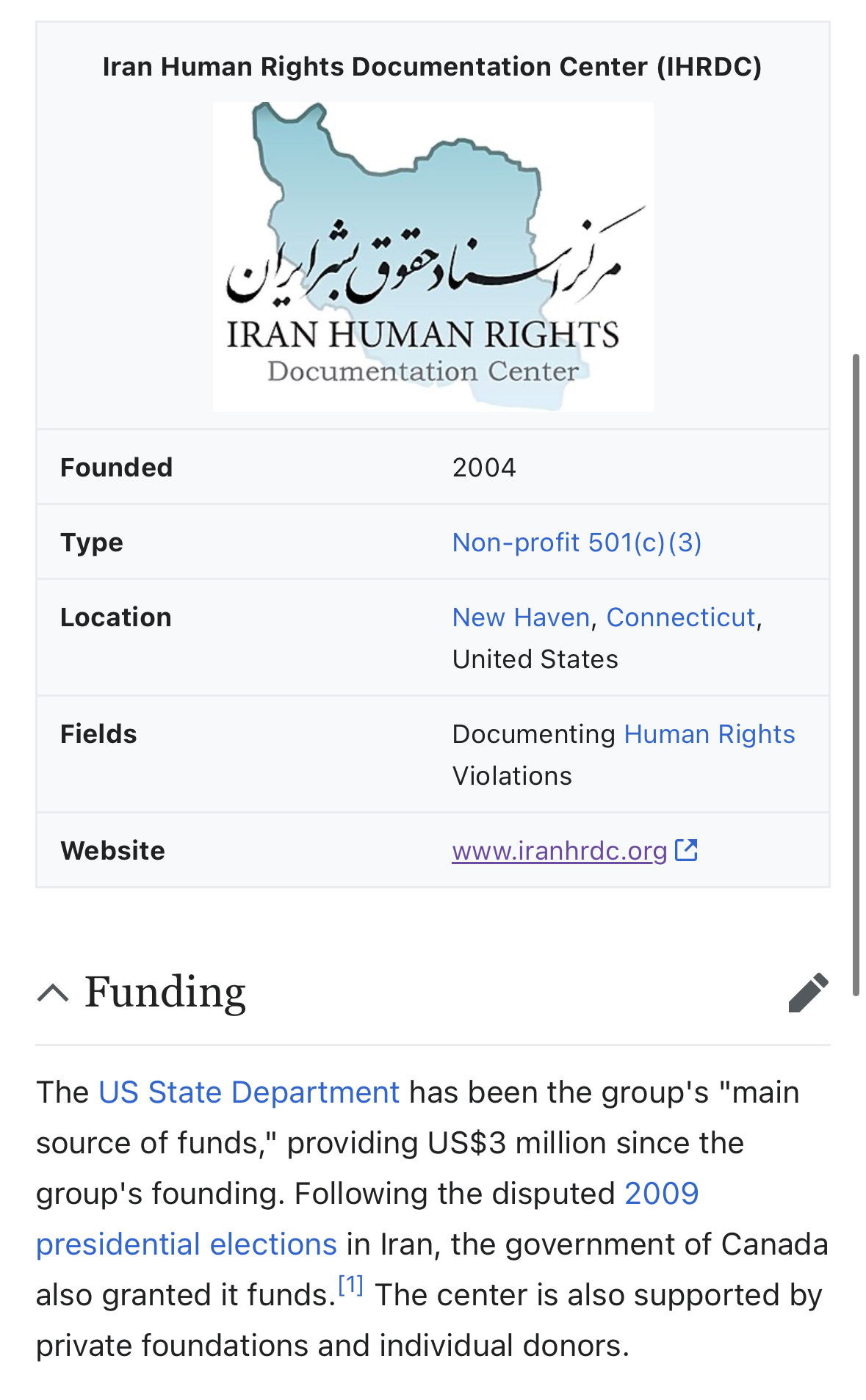
So much benefit of doubt is given to these Western aligned NGOs but not a single shred is given to an imperialized nation that is perhaps the only Islamic country on Earth to successfully and completely defeat Imperialism from it’s borders (except perhaps Algeria)?
Looking at the actual HRW report:
Immediately revoke all policies and repeal laws that legalize violations of the rights of Baha’is, including but not limited to:
- Article 12 of the Iranian Constitution
Oh Article 12 which states:
The official religion of Iran is Islam and the Twelver Ja'fari school [in usual al-Din and fiqh], and this principle will remain eternally immutable. Other Islamic schools, including the Hanafi, Shafi'i, Maliki, Hanbali, and Zaydi, are to be accorded full respect, and their followers are free to act in accordance with their own jurisprudence in performing their religious rites. These schools enjoy official status in matters pertaining to religious education, affairs of personal status (marriage, divorce, inheritance, and wills) and related litigation in courts of law. In regions of the country where Muslims following any one of these schools [fiqh] constitute the majority, local regulations, within the bounds of the jurisdiction of local councils, are to be in accordance with the respective school [fiqh], without infringing upon the rights of the followers of other schools.
So they basically want to reverse the popular revolution of the masses that overwhelmingly supported the Islamic revolution of 1979? Perhaps now we know what the geopolitical aims that this false narrative of persecutions and oppression is hoping to entail?
By the way here’s Article 13 and 14 of the constitution:
Article 13: Zoroastrian, Jewish, and Christian Iranians are the only recognized religious minorities, who, within the limits of the law, are free to perform their religious rites and ceremonies, and to act according to their own canon in matters of personal affairs and religious education.
Article 14: In accordance with the sacred verse; ("God does not forbid you to deal kindly and justly with those who have not fought against you because of your religion and who have not expelled you from your homes" [60:8]), the government of the Islamic Republic of Iran and all Muslims are duty-bound to treat non-Muslims in conformity with ethical norms and the principles of Islamic justice and equity, and to respect their human rights. This principle applies to all who refrain from engaging in conspiracy or activity against Islam and the Islamic Republic of Iran.
foreigners are moving in.
Was this made in the 1500s
Just read an article that talks about imperialism, neo-colonialism, coloniality, decoloniality and feminism that was funded by the NED.
We believe in collective movements and are interested in further observing the growing connectivity within and without the region, especially in the last few years: from Thailand to Myanmar and Hong Kong, as seen in the Milk Tea Alliance and pro-democracy movements. These show us the power of the people, who are constantly building political solidarity for a common goal. Our shared past (i.e. colonialism) still shapes our shared present struggle for an inclusive democracy.
Anti-imperialism in form but imperialism in substance.
So the collaborator oligarchs that are conducting genocide in West Papua had the audacity to ask the Western mining conglomerate Freeport to invest in downstream industries and they are complaining.
Freeport warns copper export ban could cost Indonesia $2 billion in lost revenue
Classic
diplomatic ties, China, Malaysia, anniversary, 31
> MELAKA, March 25 (Bernama) - Melaka will serve as the host for the celebration of the 50th anniversary of Malaysia-China diplomatic relations established since 1974, said Chief Minister Datuk Seri Ab Rauf Yusoh.
> He said he had sent a letter to Prime Minister Datuk Seri Anwar Ibrahim earlier to seek the Federal Government's approval for Melaka to be selected as the host for the celebration, considering that the state had established relations with the Great Wall country over 600 years ago.
> "That's why I proposed to the Prime Minister to hold the 50th anniversary celebration of Malaysia-China diplomatic relations in Melaka and it has been generally agreed upon, and we have received a letter from the Foreign Ministry to propose the celebration events," he told Bernama.
> Earlier, Ab Rauf had received a courtesy call from Bernama chairman Datuk Seri Wong Chun Wai at his office in Seri Negeri here today. Commenting further, Ab Rauf said Melaka is very famous among Chinese tourists as it is depicted in the history books of the country during the five visits of Admiral Cheng Ho to the state.
> "The history books of China (studied from elementary school to university) show Admiral Cheng Ho's [Zheng He] route to Southeast Asia, he came to Melaka five times, that's why any Chinese leader who comes to Malaysia must set foot in Melaka.
>"There are Chinese leaders who come to Malaysia, they take sand from Melaka and put it in a bottle, they take it back... (that's) how they appreciate the history between Melaka and China that began 600 years ago," he said.
> Meanwhile, Wong said Bernama is committed to supporting all efforts undertaken by the Melaka state government in the tourism sector including the celebration of the 50th anniversary of Malaysia-China diplomatic ties, Visit Melaka Year 2024 (VMY2024), World Tourism Day, and the World Tourism Conference 2025 which will also be held in Melaka.
>"I asked some Chinese tourists on Jonker Street (in Melaka) last night and they said they are more familiar with Melaka than Kuala Lumpur.
> "For them, Melaka is a historical and very important city and in conjunction with the celebration of the 50th anniversary of Malaysia-China diplomatic relations, many events will be organised, so we assure that Bernama and other media will support the state of Melaka," he said.
> Malaysia established diplomatic relations with China officially on May 31, 1974, thereby becoming the first ASEAN country to extend a hand of friendship to Beijing.
Melaka is the city in which the Straits of Malacca gets its name from. Malacca is simply the old latinised spelling for it.
China did not only interact with Islam in Central Asia, it had a a varied and influential history in Southeast Asia as part of the maritime Silk Road. Some scholars even argue that Chinese traders helped spread Islam in Southeast Asia.
I have something in the pipeline that will hopefully be finished closer to the anniversary. It will cover Malaysia-China relations over the past hundreds of years - the good and the bad, the complexities and contradictions that I hope will give readers an appreciation of SEA history and politics. I also hope it will give a brief respite to the rampant Islamophobia and Sinophobia present in Western circles.
cross-posted from: https://hexbear.net/post/2124249
Figured this should be shared here aswell.
> Hello and warm greetings to my fellow news mega enjoyers and to the wider hexbear, lemmygrad and lemmy.ml community,
>
> I've been finding myself browsing the newsmega often and was often thinking of a way that would help me contextualize the discussions and news that I'm reading. I remembered an atlas I had in school that would show the location of industries and natural ressources (and more) and decided try to recreate a digital version similar to https://atlas.cid.harvard.edu/. When I stumbled upon lemmy-js-client I found a fun way to display lemmy comments geographically, which I would like to share with you:
>
> https://hex-atlas.netlify.app/
>
> ⚠️ Spoiler Tags are not implemented thus CWs are not hidden
>
> Nexus Features:
> - @SeventyTwoTrillion@hexbear.net Bulletins
> - Hexbear Reading List (Thank you @CARCOSA@hexbear.net for the suggestions)
> - ProleWiki (Thank you Lemmygrad for maintaining this)
> - Wikipedia/Natopedia
> - Anarchist Library
>
> I'm open for suggestions, but would like to continuously add new features:
> - Mastodon.social (well documented)
> - Marxists.org (will be difficult)
> - Moon of Alabama (looks easy) (Thank you @someone@hexbear.net for pointing out the transphobia)
> - Usability and performance improvements
> - and maybe more cool features where the guiding ideas are: "IRL Victoria 3 UI" and a "cockpit for newsmega-enjoyers" (e.g. comparing regions and seeing commodity/capital flows, real-time 1% flight data, vessel data - to enjoy the ansar allah blockade, virgin chad ranking, etc.)
>
>
>
> Basic usage:
> - use query to search location by query e. g. brics and find discussions pertaining to the selected location.
>
> - the query field can also be used to find and filter content by communities that are not listed
>
> - on Mobile long press pictures to unblur it (not fully tested) on desktop hover with mouse
>
>
> It's in a prototype stage so please keep in mind:
>
> - ⚠️ Spoiler Tags are not implemented thus CWs are not hidden ⚠️
>
>
> - It's mostly optimized for desktops. Sry comrades with old hardware - no optimization, yet :(
> @kota@hexbear.net post inspired me to look into this tho.
>
>
> - Provinces/Territories: While I was doing manual edits to some regions I realized I'm doing something very political (duh). Following this, I'm looking for solutions to implement user defined regions (if there's interest from you) e.g. #fromTheRiverToTheSea #brics #udssr #whatever Comrade @SleeplessOne1917@lemmy.ml offered help, but I have only experience with front-end and am not sure how and what to propose. All my ideas are leveraging the current state of development and might be annoying to you. If you have experience, suggestions, etc. on how to make this work, feel free to start a discussion, reach out, etc.
>
>
> - Provinces/Territories: If you want something particularly aggravating changed asap, feel free to start a discussion and vOtE! I'll update manually.
>
>
> - Countries that span two continents are only displayed as belonging to one e.g. Russia - Europe (Dataset used: https://github.com/lukes/ISO-3166-Countries-with-Regional-Codes)
>
>
> - Right now this project is exclusive to hexbear, lemmygrad, lemmy.ml and their federated instances. I have an inner conflict: Generally, fuck intellectual property and I would like to make it foss, but this would make it available for lib/chud content as well. Should I? Help me resolve this.
>
>
> - No login implemented
>
>
> Please consider this a tribute to this community, which I've been lurking and a member since the r/CTH days (nevar forget). I started web development not too long ago and am deeply inspired by dev titans among others:
>
> @nutomic@lemmy.ml
>
> @dessalines@lemmy.ml
>
> @SleeplessOne1917@lemmy.ml
>
> Thank you and the mods and admins for making hexbear/lemmy what it is today.
>
> !rat-salute
>
>
> Enjoy your weekend :)
>
>
> (After I post this I will leave the computer for a while and wont be able to really check and respond for a few hours)
>
> Death to fascism
>
> Death to capitalism
>
> Death to imperialism
>
> Trans rights are human rights
>
> !
This is a repost of my comment on Hexbear’s news megathread.
I figured it would be good to post it here aswell for further visibility and perhaps invite more responses.
Euros being delusional as per usual.
Malaysia’s PM Anwar Ibrahim makes ‘no apology’ for Hamas links on Germany visit
The Malaysian PM visits Germany and gets accused of supporting Hamas by an audience member - but are these westerners completely illiterate?
> Prime Minister Anwar Ibrahim has defended Malaysia's relations with Hamas, saying he made "no apologies" for his nation's historical links with the Palestinian militant group and reiterating his stance that the Middle East conflict predates the October 7 attack on Israel.
> "What I reject strongly is this narrative, this obsession, as if the entire problem begins and ends with the 7th of October," the prime minister said. There had been decades of "atrocities, plunder and dispossession of Palestinians," he added at a press conference alongside German Chancellor Olaf Scholz in Berlin.
Despite the hysteria that the “geopolitics understanders” made about Anwar Ibrahim’s NED credentials months ago, Westerners seemingly forget that his initial rise came from the radical student organizations in the 1970s which were in-part connected with the Muslim Brotherhood, the Iranian Revolution and other influential Islamic movements at the time.
Of course he will be anti-Israel. That has been the hallmark of Malaysian foreign policy since the beginning - even with our 1st PM in 1957 - and he was the most Western friendly of them all.
As the article mentions: > Anwar's staunch support for the Palestinians can be traced back to his years as a student leader in the 1970s including as the leader of the Malaysian Islamic Youth Movement.
> Muslim-majority Malaysia does not recognise Israel's statehood. It has long been a vocal supporter of the Palestinian cause, hosting Palestinian leader Yasser Arafat in 1984 and 2001 and welcoming Ismail Haniyeh and Khaled Mashal, leaders of the political wing of Hamas, in 2020.
This reminded me of when multiple “Israeli” news outlets accused Malaysia of being the most anti-semitic country on Earth, despite historically having no native Jewish population, and a residential population that at it’s peak only reached the teens. Completely unhinged and insane.
And then there’s the palm oil issue.
Banning our palm oil will not change the fact that we were able to succesfully industrialize its production and outcompete your local biofuel industry. Europeans needs to stop barking like a rabid dog. It isn’t the 1800s or even the neocolonial late 1900s anymore.
These deindustrialization policies will not work, especially when you yourself have lost any capabilities of enacting economic warfare. Hiding behind a facade of environmentalism doesn’t change reality.
As Bloomberg noted, there will be other markets that the palm oil could be sold to. You are kneecapping yourself just to appear “environmentally friendly”.
Perhaps it’s just the final cries of a region declining into subordination. The garden after all, will inevitably be reclaimed by the jungle. It just takes time.
Also I read the worst thing ever when I was researching for the post, titled “A Close Encounter With Asia’s Anti-Semitic Capital”.
Warning: Terminal crackerism.
Oh boy I thought I would cool it with the controversial LGBT stuff on this site but my country was pulled into the Western culture war this time (making my blood boil as per usual).
The British band The 1975 decided to do a stunt where 2 male band members kissed on stage. Which was proceeded by a rant and behaviours that was very liberal, only could be done by someone who grew up in a hyper-capitalist and alienated society in which individualism festers like a plague.
Needless to say, but this sort of "activism" doesn't work. That's obvious enough.
Then the liberals that consume too much American media (or lives in America) comes out of the woodwork bashing the government for over-exaggerating, and/or praising this pathetic attempt at lecturing the barbarians for their bad values. Liberals really showcase remarkable cynicism and hatred of the masses.
The sheer chauvinism in which you come into another country as a guest to perform and then lambast government policy in which you yourself are not affected by and in which you agreed to beforehand, while at the same time breaking many social norms - well that takes the cake.
Thank you for giving right-wingers ammo to further politicize and police "LGBT" communities in this country - making it worse for everyone here by enflaming the already vicious identity politics prevalent here (referring to the local identity politics - not commenting on the American one).
Good job, colonizer. I see that the Brits still think that anyone cares about what they have to say.
The coverage by the Rolling Stone and The Independent is as chauvinistic as ever. I'd prefer it if you just called us primatives directly instead of this whole fake concern for human rights.
Atleast Reuters had the decency to mention that:
> Friday's incident sparked uproar on Malaysian social media, including among some members of the LGBT community, who accused Healy of "performative activism" and said his action could expose the community to more stigma and discrimination.
but in typical fashion doesn't mention that such behaviours, even if advocating for something the majority of the people agree, is not acceptable. It's a concert, not a political debate. Narcissistic behaviour and dysfunctional interpersonal skills (as determined by our culture and society at large) isn't something that should be promoted. Furthermore, this isn't even mentioning colonial history and ongoing imperialism.
Liberals needs to be sent into re-education camps for decades to deworm their minds from their terminal brain disease.
Alhamdullilah that most people here don't have it and recognised the chauvinism for what it is. (All non-english and many English replies on this tweet for example.)
I know pirating is always an option, and I used to play EU4 completely pirated.
But I got some credit remaining on Steam and they’re on sale right now, so lads, which should I go for?
Background info being I only played EU4 before, and enjoyed the nation-building side more rather than the military strategy. Although I was able to do some WCs back in the day and I do like micromanaging and extending a 20hr campaign into a 100hr one.
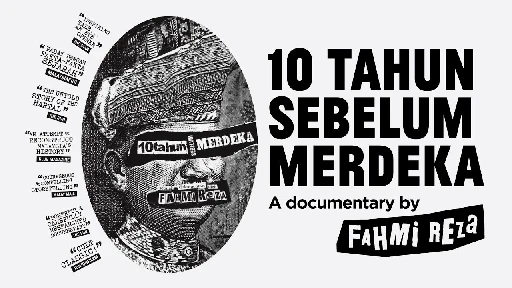
YouTube Video
Click to view this content.
About the multiracial, working class hartal I mentioned before that took place prior to the supposed communist emergency in what was then Malaya.
The word must be something non-political that is in everyday use or in common speech.
For example, in my mother language there's the word muak, which describes the feeling you get after eating the same dish repeatedly, leading to you being sick of it and not wanting to eat that dish anymore.
Tired (ie. tired of eating the same x dish/food) may be the closest word/phrase in the English language that captures the meaning, but not exactly.

Westerners crying that China helped subsidized their shitty liberal democracies since the 2000s and subsequently probably saved them from an even worse crisis than they are facing now. From Pew Research Center.
Quoted from South China Morning Post (paywalled): > Chong Ja Ian, an associate professor of political science at the National University of Singapore, said populations in Singapore and Malaysia were more “primed towards pliancy to authority” and tended to place more emphasis on economic performance.
I really do hate this rhetoric that somehow Malaysia/Singapore values authoritarianism (whatever that means). Liberal politics will never understand how even if the 2 countries are functionally 1 party states and may not be the most socially liberal places in the world, the parties carried and boosted economic performance, making both nations the top 3 in GDP per capita in southeast asia.
Personally, they would never get how economic performance has allowed my family to literally escape from poverty and peasant level subsistance farming to clean, modern houses and high-school/university education. Of course they wouldn't understand. Muh liberal values and hooman rights.
The West would rather see us fighting for scraps and being unstable and war torn like the Middle East. Fuck them.
Although the other members of the group of developing countries supported the proposal, they have yet to name the candidate countries.
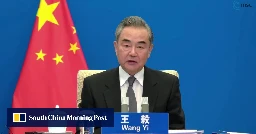
Copied below.
The BRICS countries have backed a Chinese suggestion that the bloc should be expanded, but have not named the candidate countries.
A joint statement by the foreign ministers of the bloc – whose other members are Brazil, Russia, India and South Africa – following an online meeting on Thursday supported its first expansion in a decade, but said they needed to clarify relevant guiding principles, standards and procedures.
Although no candidate countries have been named, earlier this year Argentine President Alberto Fernández said he wanted his country to join, and analysts have said Indonesia is another likely candidate.
Brazil, Russia, India and China initially formed the bloc in 2009, with South Africa joining in 2010.
The meeting of five foreign ministers, including Russia’s Sergey Lavrov, was the first since his country invaded Ukraine in February. Chinese foreign minister Wang Yi repeated Beijing’s position calling for peace talks and criticised Western countries for providing arms to Ukraine and imposing sanctions on Russia.
“Delivering arms cannot bring peace to Ukraine, and pressure by sanctions cannot solve the European security dilemma,” Wang said, according to a readout from the Chinese foreign ministry.
He said China opposes the weaponisation of international economic and financial cooperation and coercing other countries to choose sides. He also called for an effort to reduce the spillover effect of the war, which has hit international trade and food supplies “especially in supporting vulnerable developing countries to tide over the difficulties”.
The minister also urged the other BRICS countries to be “independent” and “fair” over Ukraine.
Three BRICS members – China, India and South Africa – earlier abstained from voting on a United Nations resolution to condemn Russia for its aggression against Ukraine.
The joint statement, with a brief address on the Ukraine issues, said the foreign ministers “supported Russia negotiating with Ukraine” and “discussed concerns over the humanitarian situation in Ukraine and beyond”.
Without naming the United States, Wang called on the bloc to resist the creation of “parallel systems” to divide the world. He also said BRICS nations should oppose all kinds of unilateral sanctions and “long-arm jurisdiction”.
The 25-point joint statement issued after the meeting included pledges to work together on issues such as global governance, climate change, anti-terrorism, arms control, human rights, and AI technology. China and Russia also expressed support for the three other members playing a greater role in the United Nations.
Argentina was among the nine developing countries and emerging economies taking part in a separate meeting with the BRICS countries on Thursday night.
Argentina’s ambassador to China, Sabino Vaca Narvaja, said the invitation to take part “was extremely important,” and constituted a step toward “formal entry” into the bloc. The other eight participants were Kazakhstan, Saudi Arabia, Egypt, Indonesia, Nigeria, Senegal, the United Arab Emirates and Thailand.
Jiang Shixue, director of the Centre for Latin American Studies at Shanghai University, said the expansion of BRICS is seen as an “irreversible trend” by many observers.
“Facing an increasing attack by the developed countries led by the United States, developing countries and emerging economies should expand our strength to play a bigger role in global governance,” Jiang said.
Jiang said China has been making efforts in this direction since the “BRICS Plus” formulation was first mooted in 2017 with the objective of widening the bloc’s “circle of friends”. Xu Hongcai, from the China Association of Policy Science, said the bloc should invite Group of 20 countries with international influence and large economies, such as Indonesia and Argentina.
“The G20 is composed of major developed and developing countries, BRICS lacks representation in ignoring other developing nations. It will be a good idea to first select G20 member nations to join the bloc,” Xu said.
